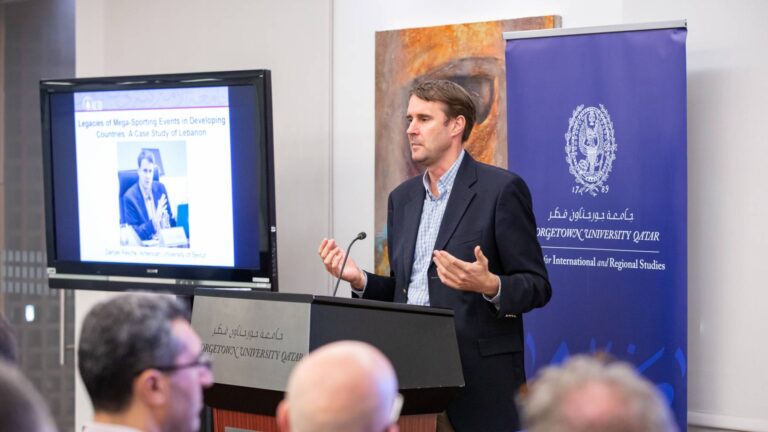Dialogue Series, Regional Studies
Sport, Politics, and Society in the Middle East

The Center for International and Regional Studies launched Sport, Politics, and Society in the Middle East at a CIRS Dialogue Series event on October 28, 2019. The edited volume examines the role that sports have played in the contemporary socioeconomic, cultural, and political milieus of the region. Danyel Reiche, Associate Professor for Comparative Politics at the American University of Beirut, presented an overview of the CIRS research project and the book, which he coedited with Tamir Sorek, Professor of Sociology at the University of Florida.
Reiche began his talk by emphasizing the growing significance of sports in the Middle East, notably in the midst of Qatar’s preparations for the FIFA 2022 World Cup. The increased attention on sports in the Middle East is reflected not only in the media, he said, but also in academia where a “growing body of scholarship, particularly on Qatar,” is shifting to sport studies. Reiche shared his observations of the close ties between the Middle East and the world of sports in the rising number of mega-sport events hosted in the region, for example, and in the sponsorship of European football clubs by Middle Eastern countries, such as Paris Saint-Germain by Qatar and Manchester City by the United Arab Emirates.
The project’s primary research questions considered the factors behind the establishment of sport in the Middle East, whether there were common patterns and dynamics throughout the region, the different roles of sport, and whether sport is serving societal change. Reiche highlighted the uniqueness of the book in terms of the research process employed. Utilizing a range of interdisciplinary social science approaches, the ten authors drew from ethnographic research, academic literature, archival work, interviews, and surveys. The chapters fall under two broad themes: the “politics and economics of sport” and sport as a “contested terrain where struggles over meaning, resources, and rights are fought.”
“Sports in the Middle East are much more than an interesting angle through which to popularize academic themes. As major political and economic forces, they not only reflect, but also shape both individuals’ lives and large-scale social processes.”
The development of modern sports in the Middle East arose in the early twentieth century in urban areas such as Istanbul, Tehran, Cairo, Beirut, and Damascus. According to Reiche, different dynamics were apparent, where “men mainly played football and basketball, while women were particularly into gymnastics.” In the contemporary era, one author used digital ethnography in researching how female athletes in the Middle East presented themselves to the public through their social media accounts. Among the similarities with Western female athletes were the use of these platforms for “self-branding and to raise awareness on the sport,” however, Middle Eastern women tended to “present themselves in a culturally more appropriate manner,” he said.
An audience member asked whether the World Cup might lead to liberalization in Qatar—in the media, for example. Reiche’s response was, “Qatar will liberalize, but on its own terms.” He also shared a “new trend in hosting mega-sporting events,” that is, co-hosting them. For example, the European Football Championship in 2000 co-hosted by Belgium and Holland, and the 2026 FIFA World Cup co-hosted by the US, Canada, and Mexico, among others. Whether Middle Eastern countries might co-host mega-sporting events given persistent problems in the region, Reiche suggested a scenario where, for example, Qatar could “host a world championship and then give few matches to a country like Lebanon.”
In conclusion, Reiche stated, “sports in the Middle East are much more than an interesting angle through which to popularize academic themes.” As major political and economic forces, sports “not only reflect, but also shape both individuals’ lives and large-scale social processes,” he said.
Danyel Reiche is Associate Professor of Comparative Politics at the American University of Beirut. He graduated with distinction from Leibniz University Hannover and joined AUB in 2008 after working as a Visiting Assistant Professor at Georgetown University in Washington, DC. His past research focused on energy as well as sport policy and politics, the latter his recent priority. Reiche published Success and Failure of Countries at the Olympic Games (Routledge, 2016) and edited, with Tamir Sorek, Sport, Politics and Society in the Middle East (Hurst/Oxford University Press, 2019). His peer-reviewed articles have been published in area study journals such as International Journal of Sport Policy and Politics and Journal of Energy Policy, and in broader-oriented journals such as Third World Quarterly and The Middle East Journal. He has written op-eds for international newspapers such as The Washington Post and Spiegel Online and is frequently interviewed and quoted by major media outlets such as Le Monde and The New York Times. Reiche chairs the Political Studies Association’s Sport and Politics Study Group.
Article by Chaïmaa Benkermi, Publications Fellow